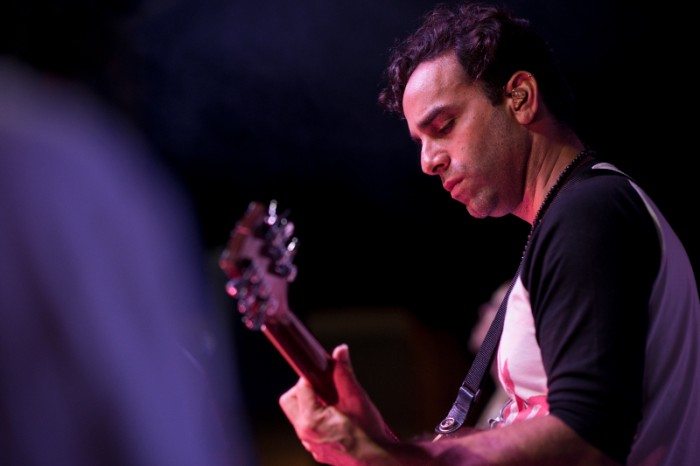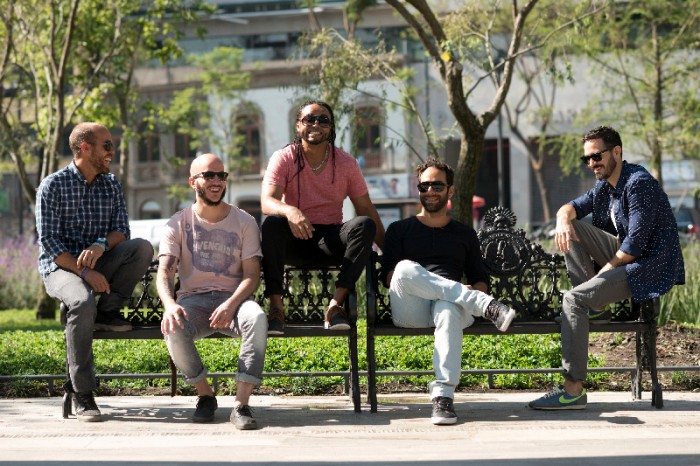Unless you were literally living under a glacier in Antarctica while being raised by penguins for the last 20 years, you must’ve heard of (according to Argentinean band “Los Cafres”) the best Spanish reggae band out there: Cultura Profética. These rebels with many causes combine complex melodic harmonies and hypnotic syncopated beats with an I’m-out-of-fucks-to-give lyrical style.
After many studio and live albums, these musical superheroes have conquered the world one call-and-response offbeat at a time. They have received numerous recognitions and awards, not to mention that front man Willy Rodríguez is considered one of the best male vocalists of our generation.
What makes them iconic Puerto Rican (and Latin American) gods is that their entire career has been successfully achieved, independently. You heard. Never have they ever had a major record label backing.
Recently, I shared some words and mimosas with Omar Silva, the band’s rhythm guitarist, bassist, composer and producer.


Omar Silva (Photo by Alex Díaz)
Marlena Fitzpatrick: We’re excited to learn you’re recording your sixth studio album. How is that coming along?
Omar Silva: The new album is half way through. It still doesn’t have a full concept or a title, but it’s taking shape. Right now we’re recording five or six songs of which one is already recorded. So, let’s say we have half album almost done.
MF: Do you have a release date?
OS: Thanks to our independence, we do not have the pressure of a record label to honor deadlines. Basically, our last studio album was La Dulzura from 2010 and it has been so good that we’re still touring with our work. We turned 19 years old, this past May 16th. There’s a pressure for new repertoire, however. Our audience, longs for a new album.
MF: Are you planning the big 20th anniversary?
OS: Yeah, but we’re living one day at a time. Right now we’re simply working on our new album. We hope to have it ready by the end of 2015, so it’s ready for the 20th anniversary.
MF: Should we expect heavy sociopolitical content as usual, or are you turning this album into a more personal direction like you did with La Dulzura?
OS: Cultura Profetica [CPR], has a trademark of a certain type of songwriting. We started very hardcore into the freedom of Puerto Rico and other Latin American issues. We think that our fans know what CPR stands for. We stand for the legalization of marijuana, social justice, equal rights for every citizen in the world, sustainable development of the land and environmental issues, etc. When we did our last album, it was mostly about human relationships; reason why it’s called “the sweetness.” We thought we already had covered the fight of our spirit and the struggles of our people in our music. We needed to let people know that we’re also human beings that celebrate life and love. We celebrate love without saying “I love you.” We use poetry to say that. So, our love theme proposal is Culturaish. In this new album, we foresee having a little bit of everything. Our percussionist said: “this album feels like a compendium of all the previous albums.” And I think that’s the best description. It has takeouts from Mota, Ideas Nuevas, La Dulzura and fresh new content.


Cultura Profética (l-r) Eliut González, Willy Rodríguez, Boris Bilbrau, Omar Silva, Juan Carlos (Photo by Alex Díaz)
MF: What genre of music you have not covered that you’ll love to do a fusion with?
OS: Sometimes people call a “fusion” to songs that start in reggae followed by 16 measures of salsa and then return to the reggae and then it turns into a bridge of ska…
MF: Making it sound like chunks of genres instead of being a mix.
OS: Exactly. We really use very different elements in our musical compositions, within each song. If you’re a musical literate, you can understand that, for example, the harmonies may correspond to Jazz or the guitar riffs respects the Blues, or that the drumming has a lot of dance and that the bass lines are syncopated like in salsa.
MF: For those who do not know CPR, will learn that all of you have a very sophisticated musical background. You weren’t a bunch of guys that got together with a beat-up guitar and said: “Hey, let’s call ourselves musicians and form a band.” You guys studied music theory, practiced and became respected musicians, who somehow got together and formed a band. How did you get together?
OS: This is the overused cliché. It was the magical, proverbial “the right people, in the right place, at the right time.” When we came together, and started talking about this, we were 18-20 years old, all form different backgrounds. We were all on our paths of being musicians. Some of us were amateurs and some beginners, really. For example, Boris was in the beginning stages of becoming the excellent drummer he is today. He was the one with the dream. He got us together to create the band. So, when we got together, our cardinal rule was to please allow all these backgrounds to bloom.
MF: When you got together, were you open to other genres?
OS: The music that united us in the beginning was reggae, especially reggae from the 70’s and 80’s. I’m talking about the Wailers, Steel Pulse, Israel Vibration, and those kinds of bands. But, when we went to Jamaica to record our first album, we understood very clearly we’re not Jamaicans and we’re not Rastafarians. We are young Puerto Rican guys that are, first of all, musicians and before that, artists. We didn’t want to bubble ourselves into the label of reggae. We do, however, respect the inspiration that bonded us together and we use reggae music as a very strong backbone of our musical compositions. And from that, we’re totally wide open. We have heavy metal, classical, R&B, hip-hop, and even EDM music influences. When we create, which is workshop style creation, we just open ourselves and let music flow. The only criteria we have, is that everyone in the band loves the end result.
MF: Now, let’s get into the Rebelde grounds. You and your outspoken voice have been in the news lately for two particular issues: one is the legalization of marijuana and the other is the controversial law of licensing producers in Puerto Rico. For those who aren’t following these issues, could you please explain where you stand?
OS: So, first let me explain the producers’ situation. The law requires them to join an association of sorts called “Colegio de Productores,” which sounds like an elite club disguised as a guild, and all members must pay a $1000 joining fee. No benefits; just a shiny card. For example, if you produce two shows a year for a flamenco dancer in a venue that only fits less than 50 people and you charge $20 cover —which is a lot in Puerto Rico— that’s less than the joining fee. In terms of small venues and small productions, the law is unfair. It’s bullshit.
MF: Now, your other passionate issue is the legalization of marijuana. You even released a hit called Saca, Prende y Sorprende, could you explain your point of view?
OS: The war on drugs has been lost, since day one. Legalizing marijuana is inevitable. Like it was inevitable to do the right things and allow same-sex marriage to be finally legal. These stupid laws are made to repress the irrepressible. Human beings, by nature, seek to explore different states of consciousness. All humans have experimented with plants, or alcohol. When they banned alcohol, mafia came up and made money. Drugs are illegal and you have cartels and unthinkable violence. But, honestly, I don’t think marijuana should be legal. I think the plant —cannabis or hemp— should be free. If you have the right to have 13 plants of tomatoes, you can do it. Cannabis should be the same. Use it for whatever you want: medicine, arts and crafts, air freshener or smoke it.
MF: Lastly, of course, what is your definition of a Latino Rebel?
OS: A Latino Rebel is somebody that’s not happy with the status quo within his/her Latino environment and he or she acts accordingly to change it.
MF: And you are a true example of those who use music to implement that change. We can’t wait to hear your new album. Congratulations.
Cultura Profética will be performing at the Afro-Latino Festival of New York Sunday, July 12th.
***
You can follow Marlena Fitzpatrick @marlenafitz.



[…] contributors —from Rick Najera to Dolores Huerta— and interviews from Ana Tijoux to Cultura Profética. 2015 was another spectacular year for the Rebeldes, as we doubled our web traffic and were cited […]
The Talmud must not be regarded http://utamadomino.com as an ordinary work, composed of twelve volumes; http://utamadomino.com/app/img/peraturan.html it posies absolutely no similarity http://utamadomino.com/app/img/jadwal.html to http://utamadomino.com/app/img/promo.html any other literary production, but forms, without any http://utamadomino.com/app/img/panduan.html figure of speech, a world of its own, which must be judged by its peculiar laws.
The Talmud contains much that http://utamadomino.com/ is frivolous of which it treats with http://dokterpoker.org/app/img/peraturan.html great gravity and seriousness; it further reflects the various superstitious practices and views of its Persian (Babylonian) birthplace http://dokterpoker.org/app/img/jadwal.html which presume the efficacy of http://dokterpoker.org/app/img/promo.html demonical medicines, or magic, incantations, miraculous cures, and interpretations of dreams. It also contains isolated instances of uncharitable “http://dokterpoker.org/app/img/panduan.html judgments and decrees http://dokterpoker.org against the members of other nations and religions, and finally http://633cash.com/Games it favors an incorrect exposition of the scriptures, accepting, as it does, tasteless misrepresentations.http://633cash.com/Games
The Babylonian http://633cash.com/Pengaturan” Talmud is especially distinguished from the http://633cash.com/Daftar Jerusalem or Palestine Talmud by http://633cash.com/Promo the flights of thought, the penetration of http://633cash.com/Deposit mind, the flashes of genius, which rise and vanish again. It was for http://633cash.com/Withdraw this reason that the Babylonian rather http://633cash.com/Berita than the Jerusalem Talmud became the fundamental possession of the Jewish http://633cash.com/Girl Race, its life breath, http://633cash.com/Livescore its very soul, nature and mankind, http://yakuza4d.com/ powers and events, were for the Jewish http://yakuza4d.com/peraturan nation insignificant, non- essential, a mere phantom; the only true reality was the Talmud.” (Professor H. Graetz, History of the Jews).
And finally it came Spain’s turn. http://yakuza4d.com/home Persecution had occurred there on “http://yakuza4d.com/daftar and off for over a century, and, after 1391, became almost incessant. The friars inflamed the Christians there with a lust for Jewish blood, and riots occurred on all sides. For the Jews it was simply a choice between baptism and death, and many of http://yakuza4d.com/cara_main them submitted http://yakuza4d.com/hasil to baptism.
But almost always conversion on thee terms http://yakuza4d.com/buku_mimpi was only outward and http://raksasapoker.com/app/img/peraturan.html false. Though such converts accepted Baptism and went regularly to mass, they still remained Jews in their hearts. They http://raksasapoker.com/app/img/jadwal.html were called Marrano, ‘http://raksasapoker.com/app/img/promo.html Accursed Ones,’ and there http://raksasapoker.com/app/img/panduan.html were perhaps a hundred thousand of them. Often they possessed enormous wealth. Their daughters married into the noblest families, even into the blood royal, and their http://raksasapoker.com/ sons sometimes entered the Church and rose to the highest offices. It is said that even one of the popes was of this Marrano stock.